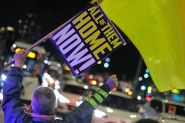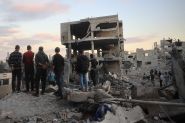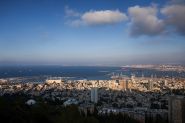- Home
- War in the Middle East
- Khalil Helou: Mutual Political Will Key to Stability in South Lebanon

International diplomatic negotiations are intensifying with a view to a new truce between Hamas and Israel. Two weeks before the start of Ramadan, the progress of these talks and the conditions of a possible truce remain unclear following a meeting in Paris between Americans, Qataris, Egyptians and Israelis, and in light of recent indirect negotiations between Hamas and Israeli representatives in Egypt and Qatar.
Uncertainty surrounds a possible extension of the truce to Lebanon's southern front, all the more so as Israeli Defense Minister Yoav Gallant affirmed on Sunday the Hebrew state's determination to "continue firing against Hezbollah regardless of what happens in Gaza, until the pro-Iranian party withdraws north (of the Litani River), whether by agreement or by force."
Contacted by This Is Beirut, retired general Khalil Helou confirmed that the truce in question remains "uncertain," especially as "no official statement has been made on the subject to date."
Turning to South Lebanon, General Helou maintained that "if a truce in Gaza were to succeed, Hezbollah would want the artillery exchanges to stop at the border with Israel." But Israel would only accept this if it guaranteed the return of settlers to their homes in northern Israel. "These settlers continue to step up the pressure on Israeli Prime Minister Benjamin Netanyahu to find a safe solution that would enable them to return to their villages. The only way to achieve this objective is to ensure that Hezbollah withdraw to a sufficient distance from the border. But there is no guarantee that such withdrawal would take place," Helou said.
The Western emissaries who are striving to avoid a widening of the conflict in southern Lebanon are counting on a three-phase agreement between Lebanon and Israel, Helou explained. This would consist of "an interim agreement that will include an 8-10 km withdrawal of Hezbollah fighters from areas close to the border with Israel, a reinforcement of the presence of UNIFIL peacekeepers and the Lebanese army in the region and the return of the inhabitants (Israelis and Lebanese) to their respective homes on both sides of the border," once the area has been secured.
But for General Helou, the proposed withdrawal formula "will not have the desired effect because of the Kornet-type precision missiles that Hezbollah has recently been firing on a massive scale." The anti-tank missiles "have a range of 8 to 10 km and cannot be detected by the Iron Dome, Israel's air defense system. They fly at a very flat parabola (maximum 45 degrees) and are very fast," he explains.
According to General Helou, "only a Hezbollah withdrawal to the north of the Litani, i.e. 30 kilometers away from the border, could be effective. But even from that distance, the Shiite party's rockets can still reach Israeli territory. So it's not a question of technicalities, but of political will, on the part of both Hezbollah and Israel," to turn the page on military conflict.
The former general is skeptical that Hezbollah's willingness to withdraw would reassure Tel Aviv. He pointed out that "if Hezbollah were to withdraw one day from South Lebanon, its rhetoric on the importance of resistance and the recovery of disputed land would fall by the wayside. We're in total limbo," Helou added.
In response to a question about the role of Arab and international mediators in this respect, General Helou reaffirmed that "their efforts, which have so far been in vain, will remain so in the absence of mutual will to reach a settlement."
He also stressed the importance of implementing UN Security Council Resolution 1701 and supporting the Lebanese army, whose current deployment in the South falls far short of the number envisaged under Resolution 1701.
Uncertainty surrounds a possible extension of the truce to Lebanon's southern front, all the more so as Israeli Defense Minister Yoav Gallant affirmed on Sunday the Hebrew state's determination to "continue firing against Hezbollah regardless of what happens in Gaza, until the pro-Iranian party withdraws north (of the Litani River), whether by agreement or by force."
Contacted by This Is Beirut, retired general Khalil Helou confirmed that the truce in question remains "uncertain," especially as "no official statement has been made on the subject to date."
Turning to South Lebanon, General Helou maintained that "if a truce in Gaza were to succeed, Hezbollah would want the artillery exchanges to stop at the border with Israel." But Israel would only accept this if it guaranteed the return of settlers to their homes in northern Israel. "These settlers continue to step up the pressure on Israeli Prime Minister Benjamin Netanyahu to find a safe solution that would enable them to return to their villages. The only way to achieve this objective is to ensure that Hezbollah withdraw to a sufficient distance from the border. But there is no guarantee that such withdrawal would take place," Helou said.
The Western emissaries who are striving to avoid a widening of the conflict in southern Lebanon are counting on a three-phase agreement between Lebanon and Israel, Helou explained. This would consist of "an interim agreement that will include an 8-10 km withdrawal of Hezbollah fighters from areas close to the border with Israel, a reinforcement of the presence of UNIFIL peacekeepers and the Lebanese army in the region and the return of the inhabitants (Israelis and Lebanese) to their respective homes on both sides of the border," once the area has been secured.
But for General Helou, the proposed withdrawal formula "will not have the desired effect because of the Kornet-type precision missiles that Hezbollah has recently been firing on a massive scale." The anti-tank missiles "have a range of 8 to 10 km and cannot be detected by the Iron Dome, Israel's air defense system. They fly at a very flat parabola (maximum 45 degrees) and are very fast," he explains.
According to General Helou, "only a Hezbollah withdrawal to the north of the Litani, i.e. 30 kilometers away from the border, could be effective. But even from that distance, the Shiite party's rockets can still reach Israeli territory. So it's not a question of technicalities, but of political will, on the part of both Hezbollah and Israel," to turn the page on military conflict.
The former general is skeptical that Hezbollah's willingness to withdraw would reassure Tel Aviv. He pointed out that "if Hezbollah were to withdraw one day from South Lebanon, its rhetoric on the importance of resistance and the recovery of disputed land would fall by the wayside. We're in total limbo," Helou added.
In response to a question about the role of Arab and international mediators in this respect, General Helou reaffirmed that "their efforts, which have so far been in vain, will remain so in the absence of mutual will to reach a settlement."
He also stressed the importance of implementing UN Security Council Resolution 1701 and supporting the Lebanese army, whose current deployment in the South falls far short of the number envisaged under Resolution 1701.
Read more




Comments